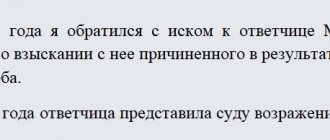Features of this document
A review (or objection) is a procedural document that must be drawn up in accordance with legal requirements. But the current legislation does not directly provide for the possibility of a plaintiff or defendant to express their opinion in this form. In this regard, the document may have different names. For example, “The plaintiff’s objection to the defendant’s review” or “Statement of disagreement with the defendant’s review.”
Since the document will be submitted to the court, its execution must comply with the general standards for drawing up legal documents. In the appeal, it is important to describe in detail the specific circumstances and present arguments that could call into question the claims of the other party. The applicant must indicate why he does not agree with the opponent, while competently referring to the law. The sample objection to recalling the defendant to the arbitration court can be taken as a basis when drawing up a similar document for personal purposes.
Some lawyers believe that filing such an appeal in court contributes to prolongation of the proceedings. It is up to the applicant to decide whether to submit a document or not.
When drafting the document, it is recommended to consider the following points:
- Concentration on fundamental nuances is important;
- the objection must be written in essence, that is, it must address issues that are directly related to the trial.
Sample of a third party's response to the arbitration court
In general, there are no particular differences in the drafting of documents on behalf of different parties to litigation. An example text might look like this:
In….. court….region…
Third person......
Plaintiff...data, address...
Defendant….data, address…
Details of the case being considered in court...full name of the judge....
Third party review
Case No.….date… is being considered in the…….. court. The plaintiff in the case is….the defendant….The plaintiff brought a claim against the defendant to recover real estate from someone else’s illegal possession, which is located at the address….
Based on the decision of the....Arbitration Court....No....date......LLC.... was brought in as a third party, which does not make independent claims.
LLC...(third party)... expresses its point of view on this dispute, namely......(for example, in the process of alienation (privatization) of property the third party did not participate, and so on).
Based on the foregoing,
I beg
- Consider the case without the participation of a third party.....
Attachments….date….signature
The legislative framework
The party that has decided to file an objection in court must be guided by the provisions of the Civil Procedure Code of the Russian Federation, and in the arbitration process - by the Arbitration Procedure Code of the Russian Federation:
- In Art. The Code of Civil Procedure of the Russian Federation states that both parties to the process have the right to file their own motions, refute the opponent’s arguments and object to the motion they filed. In the arbitration process, the defendant’s objection to the claim is his responsibility (Article 131 of the Arbitration Procedure Code of the Russian Federation).
- In civil proceedings, objections can be made by citizens, in arbitration - by a legal entity or individual entrepreneur.
A sample response to the defendant's objection to the court will be presented below.
Sample response to the appeal of the arbitration court
When drawing up objections as part of the process, you can rely on the following example:
In ……….. court ….region
(from) the defendant….
Plaintiff…..
Feedback on the appeal
To the decision of….. court….region
From...date...on case No....
...date...The Arbitration Court...of the region made a decision to collect the debt under the contract...from...in the amount of....rubles and ..% for the use of other people's funds in the amount of....rubles.
The defendant...LLC...does not agree with the decision made and believes that the decision should be canceled for reasons.....
On the basis of the above,
Ask:
- The decision of the...court...region...dated...date...No... on the claim...about...brief essence... is left unchanged and the plaintiff's appeal is denied.
Applications…
Date of compilation, signature and full name (position) of the signatory.
When may this document be required?
Litigants have the right to file motions in any situation where they disagree with the provisions of a response filed by another party. The plaintiff will be able to file a response to the defendant's objection only after the defendant has already submitted his objection to the court. The same applies to the defendant: an objection to the plaintiff's withdrawal can only be provided when the document has already been submitted to the court.
The most common situations when you need to file a petition:
- The defendant provided false information in the objection he provided; for this reason, the plaintiff wants to file a petition with his arguments.
- The plaintiff partially or fully agrees with the information provided in the defendant's objection. And in this regard, he wishes to explain this information to the court from his point of view.
- The defendant does not agree with the demands made and wishes to express his position.
During the court hearing, the statement of claim and clarifications to it will be considered first. But the objection to recalling the defendant to arbitration (a sample is at the end of the article) will also not go unnoticed.
What is the time limit for withdrawing an application?
In most cases, the standard notice period for dismissal is 14 days. But for some categories of employees it can be either less (seasonal work up to 2 months) or more (managers and their deputies). And sometimes leaving without warning or at an earlier date is acceptable (Part 3 of Article 80 of the Labor Code of the Russian Federation).
Based on the specified periods of service, the application indicates the date of dismissal.
An employee has every right to cancel his application for dismissal before the end (24-00 hours) of the one for whom he indicated in it as the last worker (Part 4 of Article 80 of the Labor Code of the Russian Federation, determination of the Supreme Court of the Russian Federation dated August 10, 2012 No. 78- KG12-10).
If an application for leave with subsequent dismissal is submitted, then it can be withdrawn before the end of the day preceding the start of the leave (Part 4 of Article 127 of the Labor Code of the Russian Federation).
Example
An employee submitted a resignation letter on 09/08/2020, indicating 09/22/2020 as the last working day. Within what period can he change his mind and withdraw his notice of resignation?The employee is given the right to withdraw a previously submitted application during the entire working period - that is, 14 days, starting from 0-00 o'clock on the day following the date of transmission of the notice to the employer.
Thus, the employee has the right to notify the employer in writing of his intention to stay until 24:00 on September 22, 2020.
The only acceptable reason for refusing to cancel a resignation letter is the presence of a written invitation from another candidate to take the place of the outgoing employee.
The answer to the question whether it is possible to withdraw a letter of resignation after the end of the warning period is negative. In this case, time for reflection is lost, and the employer has every right not to cancel the dismissal order.
Rules for filing a response to the court
A response can be submitted to the court both during preparation for the trial and during the consideration of the case.
In the first case, documents can be transferred:
- in person to the court office;
- through a representative;
- by registered mail with notification.
Attention! In 2021, it is possible to write an appeal through the electronic reception of the arbitration court. To do this, you need to fill out a special form on the official website of the government agency.
If you want to write a review
Our main task is to help you draw up procedural documents, so if you decide that writing a response to objections is necessary for you, we will tell you how to compose it.
First of all, it should be clear that a response to objections is a refutation of the arguments of the objections, that is, the incorrect information, in the opinion of the plaintiff, that the defendant presented in the objections.
If the defendant referred in his objections to certain facts that the plaintiff does not like, these facts will need to be refuted. And this is another argument against writing reviews to objections. The fact is that legal proceedings are an adversarial process, and any competition implies tactics for conducting it.
It is much better not to show all the trump cards in a response to objections, but to save them for the court hearing. By opening his cards, the plaintiff warns the defendant in advance about the direction in which he will protect his interests and thus gives him time to develop a counterposition.
Withdrawal of the application
Sample withdrawal of a petition taking into account the latest changes in the legislation of the Russian Federation.
In accordance with the requirements of Article 35 of the Civil Procedure Code of the Russian Federation, parties have the right to file petitions on a variety of issues during the court hearing. Their recall is provided in exactly the same order.
The reasons why applications may be withdrawn can be very different. Most often, such a need arises if the issue raised in the petition before the court can be resolved much easier or faster, and often cheaper. In this case, the withdrawal of the application is quite logical and, moreover, necessary.
In practice, there are cases when, already some time after filing a petition, the process changes its direction so much that the previously submitted petition loses its meaning. Therefore, such a reason can also serve as a basis for withdrawing the application.
The withdrawal of the petition must be filed with the court before the petition itself is considered. The form of its writing is not defined by law, so the applicant can prepare this document in free form. To simplify its preparation, below is a sample review that can be used in real practice.
When drawing up a review, it is necessary to indicate which specific petition is subject to withdrawal and the reasons why further consideration of the petition loses its meaning. In addition, it should be noted that the withdrawal of the petition is done voluntarily, since otherwise the court will clarify this issue during the court hearing. Cases of pressure on the side of the process are known, so it is undesirable to treat this moment carelessly.
In ____________________________ (Name of court, address)
In civil case No. ________
Plaintiff: _______________________ (full name, residential address, contact details)
Defendant: ____________________ (full name, residential address, contact details)
Withdrawal of the application
Currently, ____________________ (specify the court) is considering a civil case based on the claim of ____________________ (full name of the plaintiff) against ______________________ (full name of the defendant) about _____________________ (specify the subject of the dispute). In this process, I am ______________________ (indicate procedural position).
As part of the consideration of this dispute, I submitted a petition to the court ________________________ (indicate what the petition was filed for). This petition has not yet been resolved by the court. At the same time, I believe it is possible ___________________ (indicate the reason for filing the petition) to resolve the issue posed in a different way, which seems faster and easier (or in connection with ___________________________ (indicate why), the need to satisfy this petition has disappeared).
I refused the application voluntarily and I know the consequences of refusing it.
Taking into account the above, in accordance with the requirements of Article 35 of the Civil Procedure Code of the Russian Federation,
ASK:
Return to me without consideration the petition filed by “___” “_______” 20 __ year about _______________________________ (indicate what the applicant applied for).
Applications:
A copy of this review;
“___” “_________” 20__ Signature _________________
(5478 downloads)
How to write a response to a statement of claim?
A response to the statement of claim is a document in which the defendant sets out his position regarding the claims in the statement of claim.
Its writing is not a mandatory requirement established by law. The document is issued from the following citizens:
- defendant;
- his representative;
- third parties interested in the case.
Reference!
The document is one of the ways to protect the rights and interests of a citizen. The main advantage of a review is the absence of strict procedural rules for its preparation.
The application is written for the following purposes:
- presentation and argumentation of one’s legal position;
- consolidation of arguments and evidence in writing for the purpose of inclusion in the case.
The petition is written in clear and understandable language with a clear logical structure. Its dimensions should be within reasonable limits, which usually do not exceed 5-6 printed sheets.
from the defendant
The statement can be written either from the defendant or from his representative. In the latter case, a power of attorney must be attached to it. The statement recommends giving reasons for your opinion on each point of the plaintiff’s demands.
The purpose of the document is to draw the court's attention to any fact that can be interpreted in favor of the defendant.
third person
In Art. 35 of the Code of Civil Procedure of the Russian Federation stipulates that third parties participating in the case have the right to the following:
- provide evidence;
- take part in the study of the nuances of the case;
- express your arguments arising during the consideration of the claim;
- object to the arguments presented.
A review from a third party can be written if a citizen interested in the case wants to state his position and object to the claims.
Revocation is not an obligation, but a right. It can be submitted orally or in writing. The second option is preferable, as it will allow the citizen’s position to be recorded and included in the case materials.







